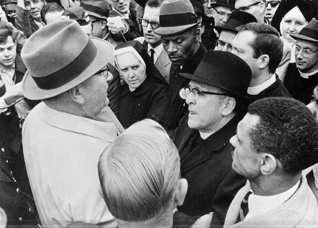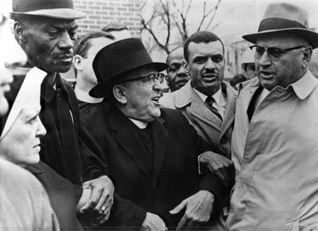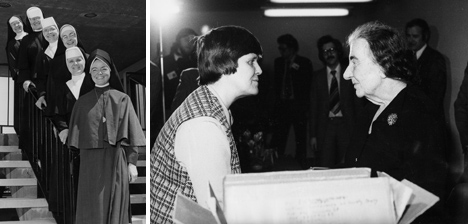Margaret Ellen Traxler, SSND
Feisty, Fearless Sister to the Poor
Margaret Ellen Traxler, SSND (Peggy) was the daughter of a country doctor and a country nurse whose family lived in Henderson, Minnesota. She could remember her parents being away for an overnight, delivering a baby at a neighboring farmhouse or caring for someone in distress. This compassion of her parents made a deep impression on her. She loved adventure, debating new ideas, and playing the trumpet. Her SSND teachers encouraged her. When she entered the School Sisters of Notre Dame in 1942, her father told Mother Andrina, Mankato Provincial Leader: “If you dare to break her spirit, she’s coming home.” Her spirit only grew stronger and Margaret was a “voice of change” throughout her lifetime as a School Sister of Notre Dame. Richard McClory, a writer for Chicago Magazine, published an article in which he recognized the energy and love for the poor that made Margaret Ellen Traxler a “voice of change.”

Wilson Baker, Director of Public Safety, Selma, a black minister
from Mississippi, Reverend John Cavanaugh, C.S.C.,
former President of the University of Notre Dame, C. T. Vivian.

The confrontation took place on March 12, 1965.
Margaret Ellen (Mary Peter) became a high school English teacher in rural Minnesota. Her student, Patricia Lefevere, remembered her passion for justice in an article in The National Catholic Reporter.
In 1963, her life was changed when bishops asked for priests and sisters to join the march for civil rights in Selma, Alabama. She called her provincial and offered to participate. This solidarity with her African-American sisters and brothers brought her face to face with injustice. At Selma, she experienced different opinions among bishops as to the role religious should play in political issues.
In 1964, she accepted a ministry with the National Catholic Conference for Interracial Justice. She initiated traveling workshops to highlight the needs of the black community as well as to educate for racial integration and universal civil rights.
Her compassion led her to minister to poor women in Chicago and in various prisons, where she heard heartbreaking stories that filled her with a passion to raise the status of women both in civil society and in the church.
Those of us who knew her recognized her strong opinions as both a challenge and a desire for dialogue on difficult issues, particularly relating to a New York Times ad during the presidential election in 1984.
Other School Sisters of Notre Dame have been inspired by her love for the poor. Some were frightened by her audacity. But most saw in this passionate woman a champion of the voiceless, especially poor women.
This desire for dialogue reminded the author of the first time she heard Margaret Ellen speak at a conference for sisters in Chicago. It was 1969 and the first two speakers, both soft-spoken Roman Catholic sisters, addressed the topics of “prayer” and “personality.” Margaret’s topic was “power.” When her turn came, she took the microphone and literally shouted into the mike, “Power!” Everyone was jolted by her shout and her presentation!
In 1997, Margaret Ellen was invited to address the General Chapter of the School Sisters of Notre Dame. In comments following her presentation, someone asked for Margaret’s forgiveness if she had ever been hurt by criticism from her own sisters. Her answer indicates her love for her sisters and their regard for her remarkable and controversial life. This indomitable spirit was present until a stroke paralyzed her in 2000. She died February 12, 2002, at the SSND retirement home in Mankato, Minnesota.

Sisters from various religious communities offered time and expertise in Traveling Workshops,
sponsored by the National Catholic Interracial Council of Christian and Jews. This
Traveling Workshop in Philadelphia, 1966 shows top-down:
Mary Yolande, OFS, Audrey Kopp, SC, Rita Zeis, SSND, Mary Mangan, SL,
Margaret Ellen Traxler, SSND and Kathleen Kelly, MM.
(Right) Margaret Ellen Traxler, SSND, received an award from
Golda Meir, Russian-born Israeli Prime Minister, for her work in helping Soviet Jews.
The archivists at Marquette University asked Margaret Ellen Traxler if they could preserve her documents to show the role of the Catholic Church in social justice issues. Among the Catholics chosen by Marquette, she joins Dorothy Day, Jessica Powers, and J.R.Tolkien. The author found her archival material a record of Catholic involvement in the major social issues of the 20th century.
A letter from concerned SSNDs to Mother Georgianne Segner, General Superior, was found among Margaret’s archival material. It is an example of the ongoing support of SSND leadership. Another letter recalls Margaret’s communication with her provincial superior, Maureen Murray.